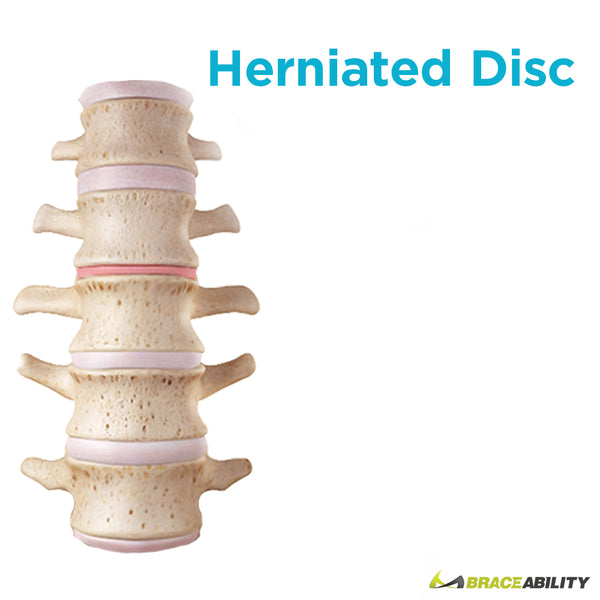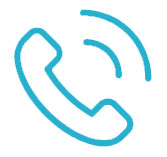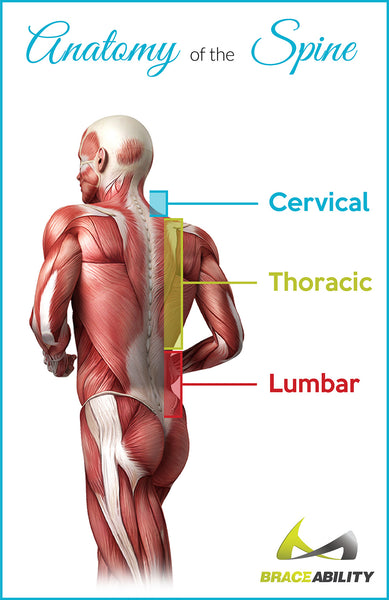Why Am I Experiencing Herniated Disc Pain?
Injury, aging, or a traumatic event can result in a herniated disc in the spine. Your spine consists of individual bones with cushions or discs in between them. When these discs slip or rupture, it pushes them out through a crack in the exterior wall creating irritation of the nearby nerves. A herniated disc is a result of gradual, overuse, or degeneration of your spine.

A herniated disc can cause a number of unpleasant symptoms, including:
- Extreme pain in your arms, legs, or back
-
Numbness or tingling in the neck shoulders, low back, hips, legs, or even the feet
-
Weakness in your muscles impairing you to hold or lift things
There are a number of herniated disc treatment options, many of which can be pursued from the comfort of your own home. In fact, non-surgical treatment for herniated disc problems is effective for roughly 90% of patients in just a month or two. BraceAbility offers a number of herniated disc back brace products that can help you get pain free.
Non-Surgical Treatments for Herniated Disc
To help ease the pain caused by your herniated disc, we recommend rest, over-the-counter (OTC) pain medications, ice or heat therapy and treatment exercises. If OTC pain medications are ineffective, a doctor might prescribe one of a number of other medical treatments for herniated disc pain such as muscle relaxers or a cortisone injection into the spine area. In a rare case, surgery may be suggested if the other methods fail to improve your symptoms.
The ice therapy lower back wrap can help with several elements of standard treatment of herniated disc troubles. This popular, lightweight brace supports the lumbar back and contains a gel pack for ice and/or heat therapy. The back brace wraps around the body and provides compression against the body, which is helpful for avoiding a number of back conditions, including troubles with the intervertebral discs.
Engaging in exercises and stretches to ease pain and later to strengthen and improve the flexibility of the core is a very important component of treatment/herniated disc prevention. Doing so can reduce the amount of strain on the back, making this a natural treatment for herniated disc troubles.
You also may want to try the Degenerative Disc Back Brace to treat your lower back and herniated disc pain. This discreet brace eases back pain and provides support without hindering motion. It also features an easy-to-reach pulley system and nylon mesh fabric, making it light and breathable.
Lumbar Back Brace for Herniated Disc
BraceAbility offers a wide selection of back brace treatment options for herniated disc troubles in any area of the spine. The herniated disc treatment brace is designed with injuries to the low-back in mind, by helping to reduce the pressure applied to your back. This along with the fact that it also will hold a gel or ice pack.
By far the most common location for a herniated disc is in the lumbar region of the spine, with the vast majority of these affecting either the L4/L5 or the L5/S1 level. For this reason, BraceAbility offers the widest selection for the treatment for herniated lumbar disc injuries type.
One of the most popular lumbar braces that is ideal for herniated disc treatment is this compression lower back support. This compression brace is fast-acting on herniated disc symptoms treatment and it helps stimulate energy. This herniated disc lower back treatment is ideal for an active way of life as it is non-restrictive and easy to strap on and take off. It can also be used for herniated disc sciatica treatment, as well.
Neck Brace for Cervical Herniated Disc Treatment
The second most common location for a herniated disc is in the cervical (neck) region of the spine. A neck brace such as the Cervical Spine Immobilizer can reduce strain on this area of the spine so that herniated disc treatment without surgery is successful. This neck collar helps to prevent a wide range of harmful neck motions and it is designed to do so in the most comfortable way possible. The support features soft, breathable padding and the brace can be molded for a customized fit.
Herniated Thoracic Disc Treatment
BraceAbility also offers some products for treatment of a herniated disc in the middle (thoracic) part of the spine. The LSO Spine Stabilization Brace is a bit of a multipurpose brace in that it provides support all the way up to the ninth vertebra, meaning it can function as everything but a cervical spine herniated disc treatment. The molded front and back panels of this brace helpt to apply intracavitary pressure to reduce load on your spine and provide relief. It also features the patented mechanical pulley system that allows you to easily adjust the compression of the support without any harmful twisting.
Proper Posture for Prevention and Treatment for a Herniated Disc
Proper posture, when seated, standing, walking, lifting—you name it, is important for both preventing injuries to the back and for herniated disc treatment. Poor form when lifting is a common cause of a lumbar herniated disc. Read BraceAbility’s proper lifting techniques for heavy lifting to prevent these injuries from occurring. This industrial back support belt can also add support and promote correct form when one is lifting.
Sitting hunched over for long periods of time can cause the discs in your spine to become compressed. Slouching can also overstretch your spinal ligaments and strain your herniated disc. If you are looking for a brace to improve your daily posture, check out this adjustable posture corrector. The brace gently pulls your shoulders back and trains your muscles to have proper posture. Good posture has additional benefits such as higher energy levels, migraine relief, prevention of back and shoulder issues, support for already existing chronic back pains, and much more.
Herniated Disc Alternative Treatment
There are a number of alternative treatments for herniated disc repair, some of which have proven more successful than others. And some of these methods are more successful as a complementary treatment. For that reason, one should always consult with a doctor before pursuing an alternative treatment for a herniated disc.
Some alternative herniated disc non-surgical treatment options include:
-
Massage
-
Traction therapy
-
Acupuncture
-
Chiropractic practices
-
Ultrasound therapy
-
Electrical stimulation
Not everyone is a candidate for such treatments. For instance, women who are pregnant or those with high blood pressure should not attempt traction therapy, which involves such things as using an inversion table to reduce the amount of gravitational force on the spine.
Not to mention, a herniated disc natural treatment like yoga can actually do more harm than good if modified poses are not used. The same can be said of chiropractic treatment for herniated disc troubles. For that reason, it is important to see a professional with experience in treatment for a cervical herniated disc, thoracic herniated disc or lumbar herniated disc.
Herniated Disc Treatment: Surgery
If conservative treatment for herniated disc troubles fails to bring relief or if the condition is disrupting one’s way of life in a significant way, a doctor may recommend one or a combination of surgical procedures to reduce the pain caused by the herniated disc pushing against the nerves of the spine:
-
Discectomy (open or a microdiscectomy): Removal of all or part of the herniated disc.
-
Laminectomy: Removal of the bone arch known as the lamina of the vertebra.
-
Laminotomy: Making an opening in the vertebral lamina to create more space for the nerve roots.
-
Spinal fusion: Using hardware and bone grafting to fuse two or more vertebrae together.
-
Artificial disc surgery: Replacing a herniated disc with an artificial one.
Following surgery and possibly during the rehabilitation process, one may need a post-operative brace, such as the spine stabilization brace. This lower back treatment product is comfortable, easy to adjust and effective for a herniated disc.














